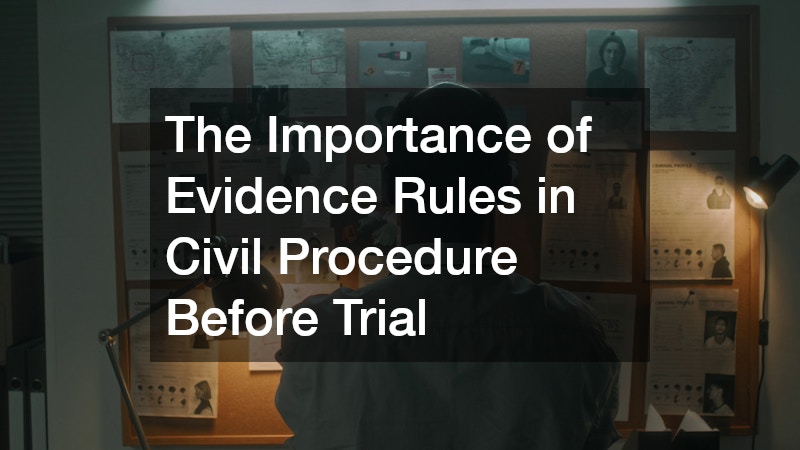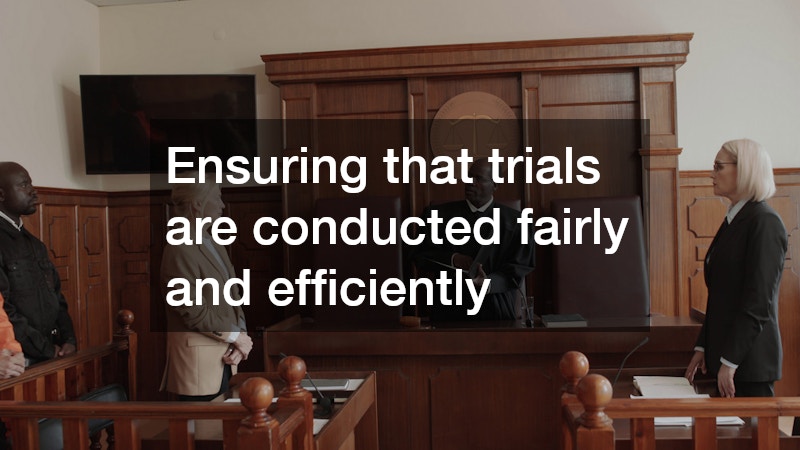
In the realm of civil litigation, the rules governing evidence play a crucial role in ensuring a fair and just process before trial. These rules help to guarantee that only relevant and reliable evidence is presented, maintaining the integrity of the legal process. This article explores the significance of evidence rules and their impact on civil procedure before trial, addressing key questions and topics of interest.
Why Are Evidence Rules Critical in Civil Trials?
Evidence rules serve as the backbone of civil trials by ensuring that the adjudication process is conducted with fairness and credibility. They are designed to eliminate any prejudicial, irrelevant, or unreliable evidence that might skew a judge or jury’s decision.
The importance of these rules cannot be understated, as they uphold the integrity of the legal system by ensuring that only evidence that meets certain criteria is considered. Moreover, they provide a framework for what can and cannot be brought forward during a trial, making the process predictable and just. These rules are not only foundational but also promote confidence among parties involved in litigation.
How Do Evidence Rules Affect Pre-Trial Activities?
Pre-trial activities are largely influenced by the strictures of evidence rules, which guide the discovery process, motions, and hearings. During discovery, parties exchange information pertinent to the case, but the scope of this information is often determined by what the evidence rules deem admissible. Legal teams must anticipate objections to evidence and engage in negotiations or further investigations to ensure all collected data is aligned with these standards. Consequently, evidence rules serve as a filter during discovery, directing resources and efforts to what will genuinely benefit the trial. This filtration process helps focus legal strategies and allocate time and effort efficiently.
What Are the Common Types of Evidence Evaluated Before Trial?
Before trial, various types of evidence are evaluated, including documentary evidence, testimonial evidence, and physical or demonstrative evidence. Documentary evidence involves written documents such as contracts, emails, or records that are scrutinized for authenticity and relevance. Legal professionals must ensure these documents are original or certified copies to satisfy evidence rules like those outlined in Federal Rules of Evidence, Rule 1002. Testimonial evidence, which involves oral statements made under oath, is evaluated for credibility, requiring thorough vetting and sometimes depositions to assess consistency and reliability. Each type of evidence must meet the threshold standards for admissibility to be useful at trial.
How Do Legal Professionals Prepare for Evidence Presentation Pre-Trial?
Legal professionals engage in comprehensive preparation for evidence presentation during pre-trial by meticulously planning their strategy around admissible evidence. They perform detailed investigations to uncover all potential evidence, ensuring it is collected, analyzed, and documented properly. This involves collaborating with experts who can testify on technical aspects, providing their insights early in the preparation process. Furthermore, legal teams anticipate and prepare to counter challenges from the opposing party regarding the admissibility of their evidence. By doing so, they increase their prospects of success in getting key evidence admitted at trial.
Once evidence is collected, attorneys engage in a process known as “mock-trial” introductions, where they practice presenting evidence, simulating courtroom conditions. This process importantly allows legal teams to refine their presentation skills and tackle any unforeseen issues by simulating cross-examinations and judge inquiries. Through this rehearsal, they develop persuasive narratives, ensuring alignment with the legal strategy and adherence to evidence rules. Practicing these scenarios helps legal professionals identify potential weaknesses in their case, allowing them to amend any issues prior to the actual trial. The preparatory work involves attention to detail and strategic thinking, both of which are essential for a successful trial.
What Challenges Arise in the Application of Evidence Rules?
Various challenges arise during the application of evidence rules, notably with interpreting and applying complex regulations across different jurisdictions. Evidence rules may differ significantly from one jurisdiction to another, requiring legal practitioners to be adept at understanding and navigating these differences. Conflicting interpretations of evidence rules can lead to disputes which necessitate sophisticated litigation strategies and adept negotiation. A particular challenge involves keeping up with amendments and changes to evidence laws, which can have significant implications for ongoing cases. Legal professionals must invest time in continuous learning to advise clients effectively and adapt to evolving legal standards.
The admissibility of digital evidence has become a contentious issue, posing significant challenges in ensuring its reliability and credibility. Issues such as data tampering, security breaches, and improper handling can lead to questions about the authenticity of digital information. Legal professionals must employ technology experts to authenticate data, ensuring its integrity before presenting it in court. Moreover, the dynamic nature of technology requires that evidence laws continually adapt, posing ongoing challenges for legal practitioners. As a result, staying informed about technological advancements is critical to managing digital evidence effectively.
Evidence rules are a foundational element of civil procedure, ensuring that trials are conducted fairly and efficiently. From shaping pre-trial strategies to delineating the admissible evidence, these rules are essential for upholding the principles of justice. As legal challenges evolve, understanding and effectively applying evidence rules remain critical for all legal professionals involved in civil litigation.




